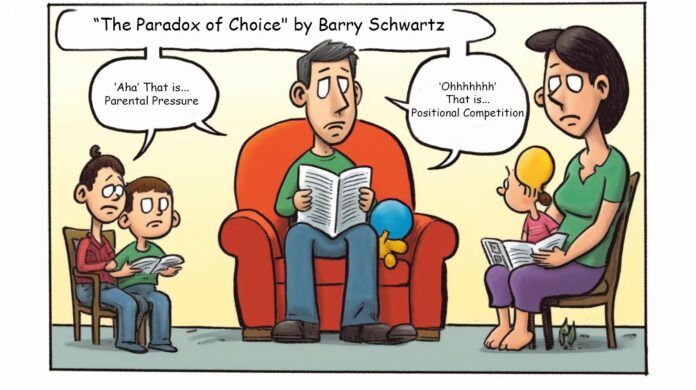Ah, the parental pressure – it’s no secret that we all want the best for our kids. But how does this desire for success play into the world of positional competition?
When it comes to businesses, it’s often a race for a limited number of positions or resources. Winning for one means losing for another. And with everyone trying to outdo each other to gain an advantage, it’s no wonder there are high-stress levels and pressure.
But does this kind of competitive environment really have a place in the world of parenting? There’s a better way to ensure our kids thrive without pitting them against each other in a cut-throat race to the top.

Parenting vs Business: The Battle for the Top Spot
I’ll be the first to admit it – I’m no angel. Far from it, actually. I’ve fallen into the parental pressure trap before, even though my drive doesn’t come from comparing my kids to others. But when I think about the insights on positional competition in business, I can’t help but see similarities in parenting. After all, don’t we all want our children to excel and come out on top?
Ever tried to have an out-of-body experience, to view yourself from an outsider’s perspective? Take a moment and see if this sounds familiar. The constant comparison of children’s achievements and abilities between parents to come out on top. It’s like a game of positional competition, where success for one means failure for another. And let’s be honest, we’ve all fallen for it at one point or another.
This represents the chicken and egg paradox and a paradox of parental pressure. This can create a culture of tension and anxiety around academic or extracurricular performance and lead to unhealthy competition between parents and children.
However, it may be more beneficial for us as parents to focus on our child’s individual strengths and interests and support their growth and development in a way tailored to their unique needs and abilities. This approach can help foster a positive and healthy relationship between parent and child while promoting overall well-being and success.
Full discloser, cards on the table
The motivation for this post came from a book I just read called ‘The Paradox of Choice by Barry Schwartz. He introduced the concept of ‘positional competition’. He provided an example of parenting that had me on the floor with laughter. I am guilty as charged.
I have a confession: I’m a victim of the paradox of parental pressure. You know what I’m talking about. It’s that vicious cycle where we want the best for our kids, pushing them to excel in everything.
But then we realise that everyone else is doing the same thing, so we push them even harder, and so on. It’s exhausting, stressful, and ultimately counterproductive.
My parenting approach has never been about striving for my kids to be the best or outdoing other children. This lesson was instilled in me at a young age when I faced the pressure of being the worst in class due to dyslexia. However, I also experienced the benefits of being one of the best in sports at my school. As a result, I can empathise with the pressure that parents of other children may feel, primarily when their child’s strengths may lie in other areas.
I’ve always had a straightforward approach for my kids – I aim for them to be ‘Merit Children’. I strive for them to achieve a merit score of 65 per cent in any area. But I expect them to excel across multiple areas rather than focus on just one. This will create well-rounded individuals without the pressure of being the absolute best.

I don’t need to compare my kids to others with this approach. I have three healthy kids, each unique with their own quirks and strengths. But, like how I was inspired by my GOAT (Greatest of All Time) parents’ hard work, I want my kids to develop a strong work ethic. A strong work ethic can overcome any obstacle regardless of academic or other abilities.
But don’t worry; I’m not here to judge or tell you what to do. Instead, I’m sharing this expanded insight I got from the book. I hope it can make you laugh a little, just like I was filled with laughter at the realisation.
Because laughter is the best medicine, right? Especially when it comes to parenting dilemmas. So sit back, relax, and enjoy this humorous look at how we all fall for the paradox of parental pressure.
The Paradox of Parental Pressure…
The paradox of parental pressure captures the dilemma we all face as parents. It’s the age-old question of how much is too much for our kids. Do we push them too hard or do we need to push them harder enough? The ‘less is more’ approach comes to mind regarding parental pressure. We want the best for our kids but avoid pushing them over the edge.
In the following sections, I’ll share some examples of how the paradox of parental pressure can manifest in different aspects of our lives. I’ll do so without being prescriptive or judgmental but with humour and anecdotes to illustrate how it affects us and our kids. So, let’s take a light-hearted look at this common parenting dilemma.
… in Education
Parents want the best for their children, encouraging them to study hard to get into a good school. But the problem is everyone else is doing the same thing. This means the competition is high, and the pressure to succeed is even higher. So parents feel like they need to push their children harder and harder just to keep up.
And if that’s not enough, parents send their children to after-school enrichment clubs and educational summer camps. The idea is to give their children an edge, but everyone else does the same. But, of course, this just adds to the pressure and competition.
Some parents believe that sending their children to private schools will give them an advantage (my kids do, so I am not one to talk). But the reality is that more parents are following suit, making it a norm rather than an exception. This means the competition is still high, and the pressure to succeed is just as intense.
Parents hire tutors and coaches to give their children an even more significant advantage. But again, everyone else is doing the same thing. This constant need to stay ahead of the game can lead to high stress and anxiety levels for parents and children.
… in Leisure
Parents often enrol their children in extracurricular activities, hoping to broaden their horizons and give them a well-rounded childhood. However, this usually leaves children with little time or energy for anything else, creating a stressful and overwhelming environment.
To keep their kids entertained and stimulated, parents may resort to buying them expensive gadgets and toys. However, this can lead to complaints of spoiling and screen addiction.
Some parents try to make their children stand out by pushing them towards excellence in a particular skill or talent, such as music or sports. But with everyone else doing the same, it can feel like a never-ending competition where the pressure to excel is high.

… in Personality
Parents often strive to instil positive personality traits in their children, such as independence and confidence. However, they can fall into the trap of micromanaging their children’s lives and not allowing them to make their own decisions.
Parents may encourage their children to pursue their passions and interests but then criticise them for not choosing a more practical or lucrative path.
Parents may also praise their children for their achievements and talents but then fall into the trap of comparing them to other children who may be doing better or achieving more. This can create a sense of pressure and competition that is unhealthy for children or their relationships with their parents.
… in Health
Parents want their children to be healthy, so they feed them nutritious and organic food to boost their immunity and growth. However, they also worry their children are not getting enough calories or variety, leading to stress and anxiety.
Parents encourage their children to exercise regularly and limit their screen time to keep them fit and active. However, they often set unrealistic goals and expectations, causing more stress and pressure for parents and children.
Parents take their children to regular check-ups and vaccinations to prevent diseases and infections. But at the same time, they expose them to germs and allergens by over-cleaning and sanitising everything, leading to health problems.
… in Socialisation
Regarding socialisation, parents want their kids to be exposed to different cultures and perspectives, so they enrol them in prestigious, diverse schools. However, sometimes this can backfire as they isolate their kids from their peers and neighbours who are not like them.
Parents arrange playdates and parties to help their children make friends and have fun. But sometimes, they interfere with their children’s choices and preferences of who they want to hang out with, creating conflicts and resentment.
Parents also want their kids to be polite and respectful to others, so they teach them good manners and values. However, sometimes they fail to model these behaviours, as they gossip and complain about other parents and teachers in front of their kids. This can create confusion and distrust in the child’s mind and undermine the parent’s authority.

… in Creativity
Parents often provide children various arts and crafts materials to stimulate their imagination and expression. However, when their children proudly present their creations and ideas, some parents may criticise or ignore them, discouraging their children from exploring their creative side.
To enhance their children’s skills and talents, parents may sign them up for various classes and workshops. However, some parents may limit their children’s options and choices based on what they think is best for them. This can stifle their creativity and prevent them from discovering their true passions.
While parents may encourage their children to be innovative and original, some parents may copy or plagiarise other people’s work and pass it off as their own. This can send a mixed message to their children and hinder their creative development.
Conclusion on Parental Pressure
Well, that was fun, wasn’t it? I hope you enjoyed reading this post and had a good laugh.
We all fall for the paradox of parental pressure, but we can break free from it. Relax, accept our kids for who they are, let go and trust the process, and have fun. Life is too short to waste on stress and pressure.
Remember, your love and care for your kids mean they are in good hands. So let’s give them the freedom to explore and discover their passions. And most importantly, let’s enjoy every moment with them. Thank you for reading!
Cool Books on Parental Pressure!
The Unlikely Art of Parental Pressure: A Positive Approach to Pushing Your Child to Be Their Best Self, by Christopher Thurber and Hendrie Weisinger, PhD.
This book addresses the biggest parenting dilemma of all time: how to push kids to succeed and find happiness in a challenging world without pushing them too far. It offers eight methods for transforming harmful pressure into healthy pressure, along with case studies, research, and practical strategies.
The Overachievers: The Secret Lives of Driven Kids, by Alexandra Robbins.
This book explores the lives of high school students under intense pressure to excel in academics, sports, and extracurricular activities. It exposes the dark side of achievement culture and its impact on mental health, self-esteem, and happiness.


